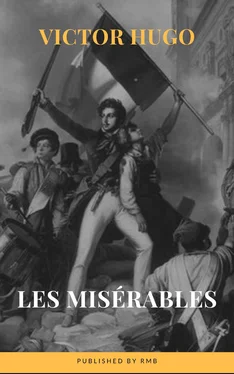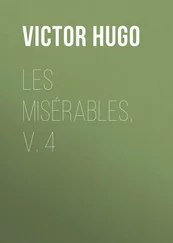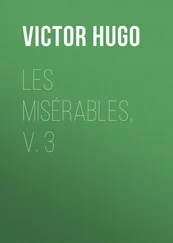Array RMB - Les Misérables
Здесь есть возможность читать онлайн «Array RMB - Les Misérables» — ознакомительный отрывок электронной книги совершенно бесплатно, а после прочтения отрывка купить полную версию. В некоторых случаях можно слушать аудио, скачать через торрент в формате fb2 и присутствует краткое содержание. Жанр: unrecognised, на английском языке. Описание произведения, (предисловие) а так же отзывы посетителей доступны на портале библиотеки ЛибКат.
- Название:Les Misérables
- Автор:
- Жанр:
- Год:неизвестен
- ISBN:нет данных
- Рейтинг книги:3 / 5. Голосов: 1
-
Избранное:Добавить в избранное
- Отзывы:
-
Ваша оценка:
- 60
- 1
- 2
- 3
- 4
- 5
Les Misérables: краткое содержание, описание и аннотация
Предлагаем к чтению аннотацию, описание, краткое содержание или предисловие (зависит от того, что написал сам автор книги «Les Misérables»). Если вы не нашли необходимую информацию о книге — напишите в комментариях, мы постараемся отыскать её.
Contains Active Table of Contents (HTML) and in the end of book include a bonus link to the free audiobook.
Sensational, dramatic, packed with rich excitement and filled with the sweep and violence of human passions, LES MISERABLES is not only superb adventure but a powerful social document. The story of how the convict Jean-Valjean struggled to escape his past and reaffirm his humanity, in a world brutalized by poverty and ignorance, became the gospel of the poor and the oppressed.
Les Misérables — читать онлайн ознакомительный отрывок
Ниже представлен текст книги, разбитый по страницам. Система сохранения места последней прочитанной страницы, позволяет с удобством читать онлайн бесплатно книгу «Les Misérables», без необходимости каждый раз заново искать на чём Вы остановились. Поставьте закладку, и сможете в любой момент перейти на страницу, на которой закончили чтение.
Интервал:
Закладка:
Sure of the issue, he encouraged with a smile, as they passed before him, the company of sappers of the first corps, which he had appointed to barricade Mont-Saint-Jean as soon as the village should be carried. All this serenity had been traversed by but a single word of haughty pity; perceiving on his left, at a spot where there now stands a large tomb, those admirable Scotch Grays, with their superb horses, massing themselves, he said, "It is a pity."
Then he mounted his horse, advanced beyond Rossomme, and selected for his post of observation a contracted elevation of turf to the right of the road from Genappe to Brussels, which was his second station during the battle. The third station, the one adopted at seven o'clock in the evening, between La Belle-Alliance and La Haie-Sainte, is formidable; it is a rather elevated knoll, which still exists, and behind which the guard was massed on a slope of the plain. Around this knoll the balls rebounded from the pavements of the road, up to Napoleon himself. As at Brienne, he had over his head the shriek of the bullets and of the heavy artillery. Mouldy cannon-balls, old sword-blades, and shapeless projectiles, eaten up with rust, were picked up at the spot where his horse' feet stood. Scabra rubigine. A few years ago, a shell of sixty pounds, still charged, and with its fuse broken off level with the bomb, was unearthed. It was at this last post that the Emperor said to his guide, Lacoste, a hostile and terrified peasant, who was attached to the saddle of a hussar, and who turned round at every discharge of canister and tried to hide behind Napoleon: "Fool, it is shameful! You'll get yourself killed with a ball in the back." He who writes these lines has himself found, in the friable soil of this knoll, on turning over the sand, the remains of the neck of a bomb, disintegrated, by the oxidization of six and forty years, and old fragments of iron which parted like elder-twigs between the fingers.
Every one is aware that the variously inclined undulations of the plains, where the engagement between Napoleon and Wellington took place, are no longer what they were on June 18, 1815. By taking from this mournful field the wherewithal to make a monument to it, its real relief has been taken away, and history, disconcerted, no longer finds her bearings there. It has been disfigured for the sake of glorifying it. Wellington, when he beheld Waterloo once more, two years later, exclaimed, "They have altered my field of battle!" Where the great pyramid of earth, surmounted by the lion, rises to-day, there was a hillock which descended in an easy slope towards the Nivelles road, but which was almost an escarpment on the side of the highway to Genappe. The elevation of this escarpment can still be measured by the height of the two knolls of the two great sepulchres which enclose the road from Genappe to Brussels: one, the English tomb, is on the left; the other, the German tomb, is on the right. There is no French tomb. The whole of that plain is a sepulchre for France. Thanks to the thousands upon thousands of cartloads of earth employed in the hillock one hundred and fifty feet in height and half a mile in circumference, the plateau of Mont-Saint-Jean is now accessible by an easy slope. On the day of battle, particularly on the side of La Haie-Sainte, it was abrupt and difficult of approach. The slope there is so steep that the English cannon could not see the farm, situated in the bottom of the valley, which was the centre of the combat. On the 18th of June, 1815, the rains had still farther increased this acclivity, the mud complicated the problem of the ascent, and the men not only slipped back, but stuck fast in the mire. Along the crest of the plateau ran a sort of trench whose presence it was impossible for the distant observer to divine.
What was this trench? Let us explain. Braine-l'Alleud is a Belgian village; Ohain is another. These villages, both of them concealed in curves of the landscape, are connected by a road about a league and a half in length, which traverses the plain along its undulating level, and often enters and buries itself in the hills like a furrow, which makes a ravine of this road in some places. In 1815, as at the present day, this road cut the crest of the plateau of Mont-Saint-Jean between the two highways from Genappe and Nivelles; only, it is now on a level with the plain; it was then a hollow way. Its two slopes have been appropriated for the monumental hillock. This road was, and still is, a trench throughout the greater portion of its course; a hollow trench, sometimes a dozen feet in depth, and whose banks, being too steep, crumbled away here and there, particularly in winter, under driving rains. Accidents happened here. The road was so narrow at the Braine-l'Alleud entrance that a passer-by was crushed by a cart, as is proved by a stone cross which stands near the cemetery, and which gives the name of the dead, Monsieur Bernard Debrye, Merchant of Brussels, and the date of the accident, February, 1637.[8] It was so deep on the table-land of Mont-Saint-Jean that a peasant, Mathieu Nicaise, was crushed there, in 1783, by a slide from the slope, as is stated on another stone cross, the top of which has disappeared in the process of clearing the ground, but whose overturned pedestal is still visible on the grassy slope to the left of the highway between La Haie-Sainte and the farm of Mont-Saint-Jean.
On the day of battle, this hollow road whose existence was in no way indicated, bordering the crest of Mont-Saint-Jean, a trench at the summit of the escarpment, a rut concealed in the soil, was invisible; that is to say, terrible.
Chapter 8 The Emperor puts a Question to the Guide Lacoste
So, on the morning of Waterloo, Napoleon was content.
He was right; the plan of battle conceived by him was, as we have seen, really admirable.
The battle once begun, its very various changes,—the resistance of Hougomont; the tenacity of La Haie-Sainte; the killing of Bauduin; the disabling of Foy; the unexpected wall against which Soye's brigade was shattered; Guilleminot's fatal heedlessness when he had neither petard nor powder sacks; the miring of the batteries; the fifteen unescorted pieces overwhelmed in a hollow way by Uxbridge; the small effect of the bombs falling in the English lines, and there embedding themselves in the rain-soaked soil, and only succeeding in producing volcanoes of mud, so that the canister was turned into a splash; the uselessness of Pire's demonstration on Braine-l'Alleud; all that cavalry, fifteen squadrons, almost exterminated; the right wing of the English badly alarmed, the left wing badly cut into; Ney's strange mistake in massing, instead of echelonning the four divisions of the first corps; men delivered over to grape-shot, arranged in ranks twenty-seven deep and with a frontage of two hundred; the frightful holes made in these masses by the cannon-balls; attacking columns disorganized; the side-battery suddenly unmasked on their flank; Bourgeois, Donzelot, and Durutte compromised; Quiot repulsed; Lieutenant Vieux, that Hercules graduated at the Polytechnic School, wounded at the moment when he was beating in with an axe the door of La Haie-Sainte under the downright fire of the English barricade which barred the angle of the road from Genappe to Brussels; Marcognet's division caught between the infantry and the cavalry, shot down at the very muzzle of the guns amid the grain by Best and Pack, put to the sword by Ponsonby; his battery of seven pieces spiked; the Prince of Saxe-Weimar holding and guarding, in spite of the Comte d'Erlon, both Frischemont and Smohain; the flag of the 105th taken, the flag of the 45th captured; that black Prussian hussar stopped by runners of the flying column of three hundred light cavalry on the scout between Wavre and Plancenoit; the alarming things that had been said by prisoners; Grouchy's delay; fifteen hundred men killed in the orchard of Hougomont in less than an hour; eighteen hundred men overthrown in a still shorter time about La Haie-Sainte,—all these stormy incidents passing like the clouds of battle before Napoleon, had hardly troubled his gaze and had not overshadowed that face of imperial certainty. Napoleon was accustomed to gaze steadily at war; he never added up the heart-rending details, cipher by cipher; ciphers mattered little to him, provided that they furnished the total, victory; he was not alarmed if the beginnings did go astray, since he thought himself the master and the possessor at the end; he knew how to wait, supposing himself to be out of the question, and he treated destiny as his equal: he seemed to say to fate, Thou wilt not dare.
Читать дальшеИнтервал:
Закладка:
Похожие книги на «Les Misérables»
Представляем Вашему вниманию похожие книги на «Les Misérables» списком для выбора. Мы отобрали схожую по названию и смыслу литературу в надежде предоставить читателям больше вариантов отыскать новые, интересные, ещё непрочитанные произведения.
Обсуждение, отзывы о книге «Les Misérables» и просто собственные мнения читателей. Оставьте ваши комментарии, напишите, что Вы думаете о произведении, его смысле или главных героях. Укажите что конкретно понравилось, а что нет, и почему Вы так считаете.












